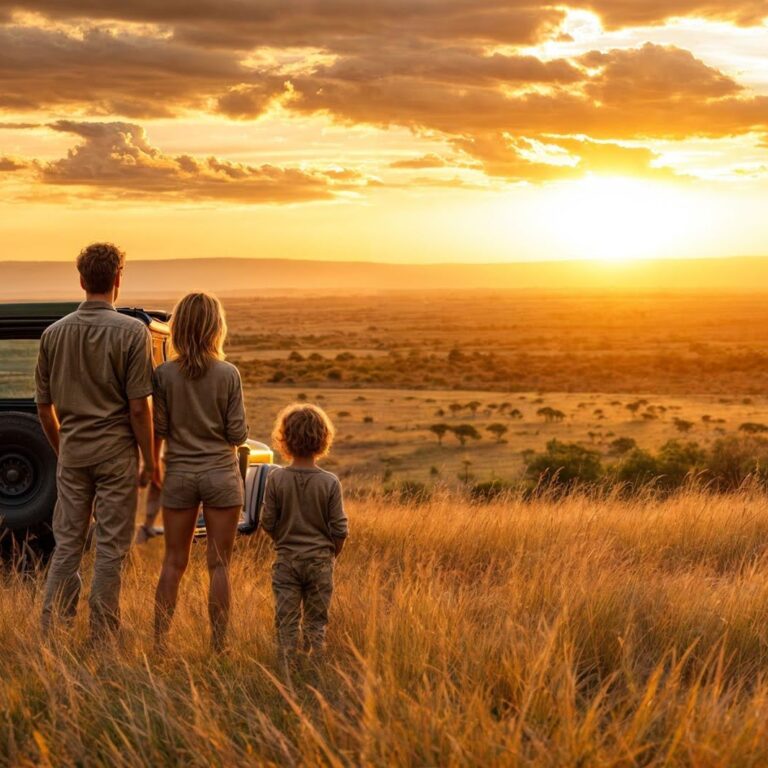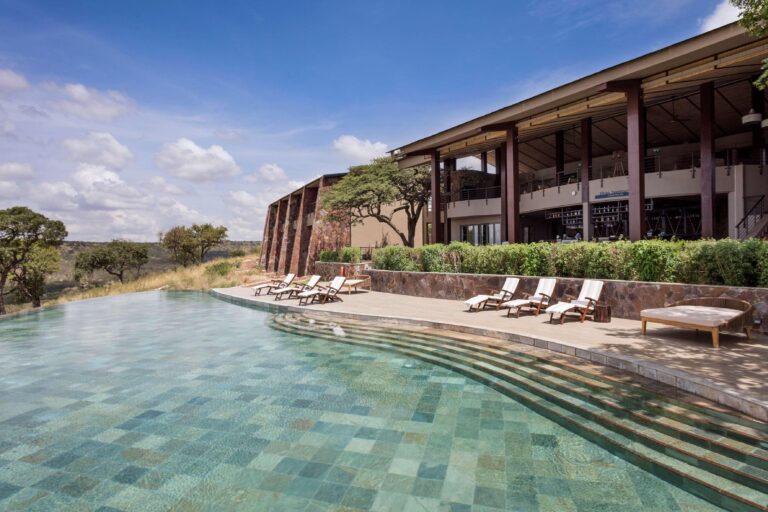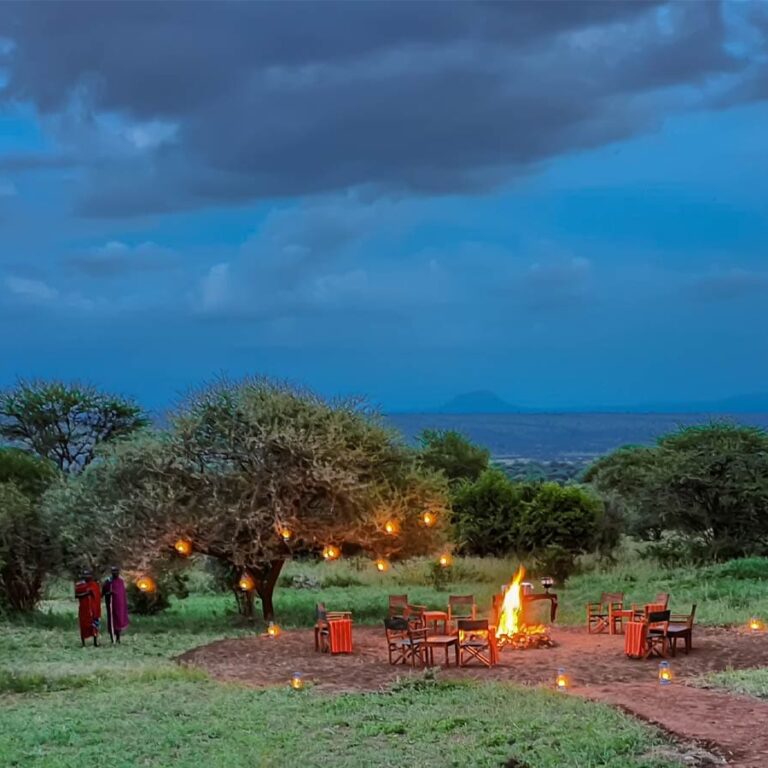The dream of an African safari often ignites with a single image: a lion silhouetted against a fiery sunset, a herd of elephants traversing the dusty plains, the vibrant plumage of an exotic bird flitting through the acacia trees. Once this dream takes hold, the practicalities of planning begin to surface, and one of the most crucial questions arises: How far in advance should I book my African safari? For peak safari seasons, booking 9-12 months in advance is recommended to secure your spot, as these times are often the most crowded and expensive. If you’re flexible with your travel dates or prefer shoulder or off-peak seasons, you can likely book 3-6 months in advance.
Unlike more spontaneous getaways, an African safari requires a degree of foresight and strategic planning. The answer to the booking timeline isn’t a one-size-fits-all, as it depends on various factors, including your travel style, desired level of luxury, specific destinations, and travel dates. However, as a general rule of thumb, booking your African safari 9 to 18 months in advance is highly recommended to secure the best options and prices. Let’s delve into the compelling reasons why early booking is your most prudent path to an unforgettable African adventure:
1. Securing Your Preferred Accommodations: Location, Luxury, and Availability
The quality and location of your chosen lodges and camps can significantly impact your safari experience. Prime accommodations, especially those situated within or bordering national parks and offering exceptional wildlife viewing opportunities, often have limited capacity and book up well in advance, particularly during peak seasons. Booking early provides you with a wider selection of accommodations, allowing you to choose the perfect setting that aligns with your preferences and budget. Whether you envision a secluded eco-lodge with breathtaking views, a luxurious tented camp with personalized service, or a strategically located lodge offering easy access to key wildlife areas, early booking increases your chances of securing your desired option. Waiting until the last minute often means settling for whatever is still available, potentially compromising on location, amenities, or overall experience.
2. Accessing the Best Rates and Early Bird Discounts: Your Wallet Will Thank You
Just like airlines and hotels, many safari lodges and tour operators offer early booking discounts and special offers to incentivize travelers who plan ahead. These discounts can translate to significant savings, allowing you to allocate your budget to other enriching aspects of your trip, such as extending your stay, opting for more exclusive experiences, or indulging in higher-end accommodations. By booking early, you position yourself to take advantage of these advantageous rates before they disappear as availability decreases closer to the travel dates. Think of it as a reward for your proactive planning – a chance to maximize your safari experience without straining your budget.
3. Ensuring Availability During Peak Seasons: Don’t Miss the Spectacle
African safaris are particularly popular during the dry seasons, which generally offer the best wildlife viewing conditions and more comfortable temperatures. These peak periods, often coinciding with school holidays and major travel seasons, experience high demand. Booking well in advance is essential to guarantee your spot, especially if you are traveling during these times. Imagine setting your heart on witnessing the Great Migration in the Serengeti or the wildebeest birthing season. Only to find that all suitable accommodations and tours are fully booked. Early planning ensures that you don’t miss out on these iconic natural events due to lack of availability.
4. Tailoring Your Itinerary and Securing Permits for Specific Activities
An African safari is rarely a one-size-fits-all experience. Booking early provides you with ample time to collaborate with your chosen tour operator to customize your itinerary to your specific interests and preferences. Whether you want to focus on specific wildlife sightings or incorporate cultural visits. Add walking safaris, or dedicate more time to birdwatching, early planning allows for these personalized touches. Furthermore, certain highly sought-after activities, such as trekking permits on Mount Kilimanjaro. Have limited availability and often require booking several months in advance. Early planning ensures that you can secure these permits and incorporate these unique experiences into your honeymoon.
5. More Time for Planning and Preparation: A Stress-Free Journey
Beyond the tangible benefits of savings and availability, booking early allows for a more relaxed and thorough planning process. You’ll have more time to research different destinations, compare tour operators, arrange necessary vaccinations and travel documents (including visas), and pack thoughtfully. This reduces the stress and potential for last-minute scrambles often associated with rushed bookings. Having ample time also allows you to delve deeper into the destination’s culture, wildlife, and conservation efforts, enriching your overall experience and building anticipation for your adventure.
6. Better Flight Options and Potentially Lower Airfares
The journey to Africa often involves long-haul flights, and securing these early can lead to better flight options in terms of schedules, direct routes, and potentially lower airfares. Last-minute flight bookings tend to be more expensive and may involve inconvenient layovers or less desirable departure times. By booking your safari well in advance, you can often coordinate your flights to align perfectly with your chosen itinerary. Giving you more flexibility and potentially saving you money on air travel.
7. High vs. Low Season
Many safari destinations have distinct high and low seasons. The high season typically coincides with dry months when animals congregate around water sources, making them easier to spot. This period can vary by region but is often during the dry season, from May to October. During this time, it is advisable to book your safari at least 6-12 months in advance to secure the best lodges and guide services. Conversely, the low season may offer fewer visitors and lower prices, which can be appealing. However, wildlife sightings may be less predictable. If you’re considering a low-season safari, booking 3-6 months in advance should suffice, but flexibility is essential.
Factors Influencing Your Booking Timeline
While the 9-to-18-month window is a good general guideline, several factors can influence your ideal booking timeframe. Several factors influence how far in advance people tend to book accommodations, impacting the booking timeline. These include seasonality, location, Availability, Pricing, Promotional Offers, guest type, and external events.
- Travel Style. If you are seeking highly exclusive or boutique accommodations with limited availability. Booking even further in advance (18-24 months) is advisable. For more flexible or budget-conscious travelers, a slightly shorter lead time might be possible, but still aim for at least 6-9 months.
- Destination. Popular destinations and specific parks, especially those known for seasonal events like the Great Migration, tend to book up faster. Less-visited or off-the-beaten-path destinations might offer more flexibility.
- Group Size. Larger groups often require more advance planning to secure suitable accommodations and coordinate logistics.
- Flexibility. If your travel dates are flexible, you might have more leeway with booking closer to your departure. However, for specific dates, especially during peak seasons, early booking is crucial.
Tips for Booking Your African Safari
By following these steps, Important considerations when booking an African Safari in Advance, you can effectively plan and book your African safari in advance, ensuring a memorable and rewarding experience.
- Book Early, Book Smart: For peak season and popular destinations, book 12-18 months in advance .
- Do your research: Decide on your desired destinations, activities, and level of luxury.
- Contact reputable tour operators: Get quotes and discuss itinerary options. Foot Slopes Tours and Safaris best travel agency for African safari recommended choosing a country and then booking with a reputable local safari company rather than paying a middleman a premium to book for you.
- Be flexible with dates if possible: Shoulder seasons (just before or after peak season) can offer good value and fewer crowds.
- Read reviews: Check the reputation of tour operators and accommodations.
- Understand the booking terms and conditions: Pay attention to cancellation policies and payment schedules.
- Secure your flights and travel insurance early as well.
- Packing: Pack neutral-colored clothing, comfortable walking shoes, and essentials like sunscreen, insect repellent, and binoculars.
- Visas and vaccinations: Research visa requirements and necessary vaccinations well in advance.
The Risks of Last-Minute Booking:
Waiting until the last minute to book your African safari can lead to several disadvantages:
- Limited Availability: You may find that your preferred accommodations and tours are fully booked.
- Higher Prices: Last-minute bookings often come with premium prices as availability dwindles.
- Restricted Itinerary Options: You may have to settle for pre-packaged itineraries with little room for customization.
- Increased Stress: Rushed planning can lead to errors and unnecessary stress.
How Far In Advance is Needed To Book a Serengeti Safari
Booking a Serengeti safari ideally requires 6 to 12 months in advance, especially during peak seasons like the Great Migration (June–October). Early planning ensures availability at preferred lodges and better rates. Luxury camps and guided tours fill up quickly due to limited space. For budget options or off-peak travel, 3 to 6 months may suffice. Last-minute bookings are possible but risk limited choices. Check this: Why You Should Book Your Tanzania Safari Far in Advance?
How Far In Advance Needed To Book Ngorongoro Crater Safari
To visit the Ngorongoro Crater, it’s best to book your safari 6 to 12 months in advance, especially during high season (June to October and December to February). This popular UNESCO site has limited accommodations and strict entry quotas, so early booking ensures your spot and preferred lodging. For low season visits, 3 to 6 months may be enough, but choices can still be limited. Last-minute trips are possible but come with risks of higher prices and fewer options all this indicates how far in advance you should book an African Safari. Planning ahead guarantees a smoother, more enjoyable experience in this iconic Tanzanian destination. Check this: Tips for Planning Your Wildebeest Migration Safari.
The Ultimate Guide to Book an African Safari in Advance
Planning the ultimate African safari starts with booking well in advance—ideally 9 to 12 months before your trip. This ensures access to top lodges, prime wildlife viewing seasons, and smoother travel logistics. Early booking is essential for iconic experiences like the Great Migration or visits to Ngorongoro Crater and Botswana. It also allows time to secure permits, domestic flights, and expert guides. Whether seeking luxury or adventure, this guide helps you navigate timing, destinations, and booking tips for a seamless safari experience. Advance planning turns your dream African safari into an unforgettable reality.
Where to begin planning for a Safari? Lots of questions
Planning a safari begins with asking the right questions. Where do you want to go? Tanzania Serengeti, Tarangire, Lake Manyara, Arusha National Park. Ngorongoro Crater, Mount Kilimanjaro. Lake Eyasi, Lake Natron, city tours, and Zanzibar beach vacation holiday, Africa? What wildlife do you hope to see? What’s your budget and preferred travel style—luxury or adventure? When is the best time to visit? How long can you stay? Start by researching destinations, wildlife seasons, and accommodations. Decide if you want a guided tour or a custom itinerary. Reach out to reputable safari operators for expert advice. With so many choices, asking the right questions early helps shape a safari that matches your dream and budget.
Advice & Tips for going on a safari in Africa
Embarking on an African safari is thrilling and unforgettable. Dress in neutral colors for blending in and comfort. Pack light but include essentials like binoculars, sunscreen, insect repellent, and a good camera. Always follow your guide’s instructions—safety comes first. Early mornings offer the best wildlife sightings, so be prepared for early starts. Respect the animals’ space and observe quietly. Stay hydrated, and enjoy every moment of nature’s raw beauty. Check this: How to Prepare For Tanzania Safari?
When to Start Planning Luxury African Safari Tours
Planning a luxury African safari should begin 9 to 12 months in advance, especially for peak travel seasons like June to October. Early planning ensures access to top lodges, private guides, and prime wildlife viewing locations. Popular destinations such as Serengeti National Park, Tarangire, Lake Manyara, and Ngorongoro Crater in Tanzania fill up quickly. Booking early also allows time for securing travel documents, vaccinations, and customized itineraries. Whether you’re celebrating a special occasion or seeking an exclusive adventure, advance planning guarantees a seamless, personalized experience with the best service and comfort Africa has to offer.
The Complete African Safari Guide
The Complete African Safari Guide is your essential companion for planning an unforgettable journey into the wild. It covers everything from choosing the best destinations—like Kenya, Tanzania, Botswana, or South Africa—to selecting the right time to go based on wildlife migrations and weather. Learn what to pack, how to stay safe, and what to expect from game drives and lodges. With expert tips on photography, local culture, and conservation, this guide ensures you’re well-prepared for an enriching and responsible safari experience, whether it’s your first trip or a return to Africa’s majestic landscapes. Check this: Tips for Planning an African Great Migration Safari.
How far in advance should you book Tarangire, Lake Manyara, Mount Kilimanjaro, and Zanzibar Safari Trips?
To secure the best accommodations and experiences, book your Tarangire, Lake Manyara, Mount Kilimanjaro, and Zanzibar safari trips 6 to 12 months in advance. Peak seasons—June to October and December to February—fill up quickly, especially for Kilimanjaro treks and beachfront resorts in Zanzibar. Early planning ensures availability of top guides, prime wildlife viewing, and smoother travel logistics. It also allows time for obtaining necessary visas, vaccinations, and fitness preparation for Kilimanjaro. Booking well ahead guarantees a more personalized and stress-free adventure across Tanzania’s diverse landscapes, from thrilling safaris to serene island escapes. Check this: How Far in Advance Should You Book your Kilimanjaro Climb?
Final thought: The Early Planner Reaps the Rewards
In the realm of African safaris, the adage “the early bird gets the worm” rings particularly true. Booking your adventure well in advance – ideally 9 to 18 months – unlocks a wealth of benefits, from securing your dream accommodations and accessing better rates to tailoring your itinerary and ensuring availability during peak seasons.
While spontaneity can be appealing for some types of travel, an African safari is an investment in a truly extraordinary and often once-in-a-lifetime experience. By embracing the foresight of early planning, you pave the way for a smoother, more personalized, and ultimately more rewarding journey into the heart of Africa’s breathtaking wilderness. So, if the call of the wild is beckoning, start planning your adventure today – the early planner is sure to reap the magnificent rewards.








